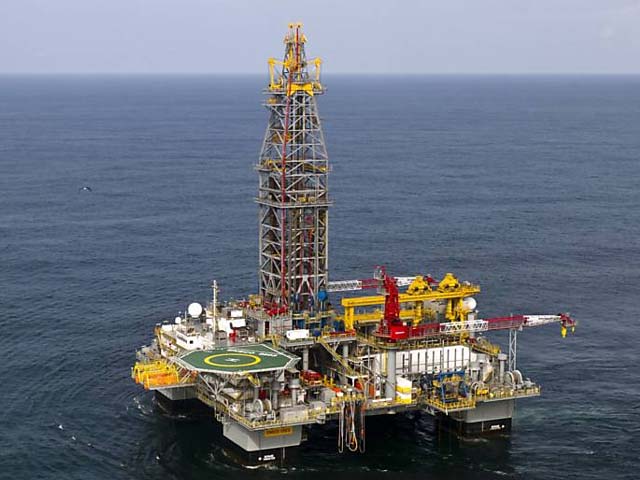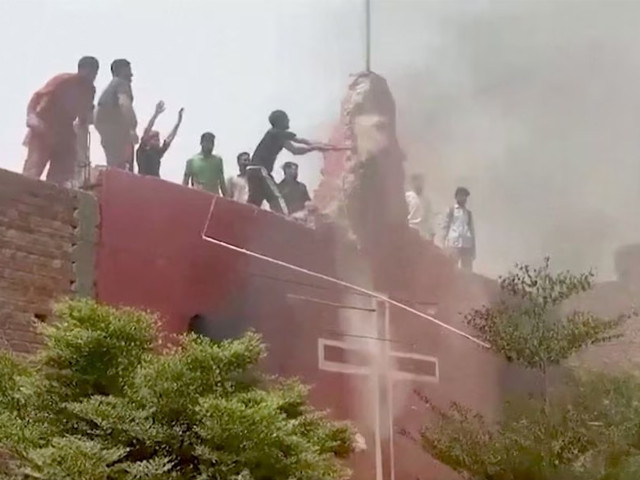
This marks Pakistan’s 18th attempt at trying to find oil in the deep sea. PHOTO: AFP
Not finding oil reserves was expected, but PTI had to save face so it gave false hope
PTI itself framed it as a game-changer and raised hopes. It was just a way to buy time and deflect criticism.
After a lot of anticipation, the news finally arrived a few days ago that the much hyped oil exploration off the shore of Pakistan has ended in failure. This attempt by Exxon Mobil has cost the Pakistani exchequer about $100 million.
This failure marks Pakistan’s 18th attempt at trying to find oil in the deep sea, but this should not be a cause for concern as offshore drilling is considered to be a ‘high risk, high reward’ business with a small chance of success associated with each attempt. Moreover, although this attempt is a failure, experts are hoping that future exploration in the same area may yield positive results since this region has lots of potential. Failure in one particular attempt does not mean that it’s the end of the road. For example, India found offshore oil reserves from its ‘Bombay High Well’ well after the 40th attempt. Likewise, Norway found oil after repeated failures.
Considering the above, it is unfortunate that this failure has ended up generating so much attention. Right now, as I write these sentences, social media is ablaze and heated discussions are taking place over this episode. The Indian media are also having a field day and some of their newspapers have adopted a mocking tone. Some of the Pakistani critics are also scornful of the Pakistan Tehreek-e-Insaf (PTI) government and its leader Imran Khan for the exploration’s failure. On the other hand, PTI supporters are getting angry at the critics, accusing them of feeling pleasure in Imran’s failure whereas, in reality, the country has lost.
However, what PTI supporters are overlooking is that Imran and his party that are primarily responsible for this. As already mentioned, a failure in this kind of exploration is no big deal. In fact, it is expected. Yet, this failure is generating international news as well as weird conspiracy theories.
More than the failure, it was the premature hype which has led to this scenario. In normal circumstances, this failure would have been completely ignored. However, it was not ignored because Imran had been talking about a possible oil discovery for months. He needlessly politicised the exploration and in fact went to the extent of saying that the discovery would eliminate Pakistan’s energy issues for 50 years. Following Imran’s lead, PTI ministers like Faisal Vawda made absurd claims that Pakistan would attain great prosperity within the next few weeks. He also said that the public should tear him apart if his claim was subsequently proven false.
It turns out that in 10 days or 2 weeks or 6 weeks there's not going to be a single person unemployed in Pakistan. Don't ask how. I believe Faisal Vawda. For this is Pakistan's "aloo se sona banao ga moment." pic.twitter.com/JNGFP6hJXI
— Naila Inayat (@nailainayat) April 8, 2019
Since members of PTI had themselves inflated the whole thing, critics are perfectly within their right to mock the party. The PTI government itself framed it as a game-changer and raised hopes to an unprecedented level. For the past few months, many supporters of PTI further fuelled the hype, even though experts had declared about a month ago that chances of such a mega discovery were very slim. Today, the party is facing criticism because it over-hyped the entire issue and, as a result, has now ended up looking like a fool. Accusing critics of “rejoicing” over the failure of the discovery is not correct. More than not finding the reserves, it’s the raising of false hopes which is problematic.
Moreover, what the party overlooked was that oil discovery, even if it materialises, is not a game-changer in the modern day. It may have turned things around for Arab countries who had a very low population and because finding oil was a really big breakthrough at that time. But even for those countries, it resulted in a resource curse which precluded development in other key socio-economic aspects such as democracy, human rights, and economic diversification. Some nations like Venezuela and Angola even faltered in their economic growth, mainly due to their abundance of oil. A country like Pakistan, which is overpopulated and has a variety of economic and social problems, does not have the potential to reap the full magnitude of the benefits which Imran and his ministers were claiming.
Furthermore, after oil reserves are discovered, it takes time and lots of infrastructural investment before these reserves can give commercial dividends. Yet, PTI framed it as an immediate game-changer, which led to the raising of false expectations.
But why did PTI do it? I personally think that since they are failing in governance and many people are losing confidence in them, raising people's hopes was a way to buy time and deflect criticism. It’s only human nature; we are willing to tolerate hardships if we have an assurance of a good future. In fact, the raising of hopes in this case is merely a continuation of the strategy which PTI has so far adopted. Imran, during his election campaign, promised a dramatic improvement in the economy, which so far has completely failed to materialise.
In fact, after PTI has come to power, Pakistan has witnessed a worsening of literally every major economic indicator. Likewise, he promised the elimination of corruption and money laundering but instead, scandals are breaking out about his own government’s projects. Confronted with failure, PTI has simply resorted to the old practice of raising false hopes.
Perhaps PTI also believed its own rhetoric. Completely failing to govern, it also needed that oil miracle, no matter how unlikely. When Imran asked the nation to offer prayers for the discovery of gas, he himself desperately wanted the gas to be found because of its diversion value. In all likelihood, the party and its leader have also accepted that they are unable to deliver due to their own incompetence. Consequently, they have started wishing for miracles and potential jackpots and, even worse, are trying to encourage the nation to do the same.
What PTI needs to understand is that governance is a serious business and needs proper attention. Right now, we are in an economic mess of unprecedented proportions. Raising false hopes to cover failures is not going to solve our problems.




COMMENTS
Comments are moderated and generally will be posted if they are on-topic and not abusive.
For more information, please see our Comments FAQ